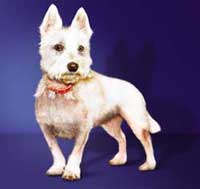Regarding [#Pet_Name], here is some information about Atopic Dermatitis (Atopy).
Description:
Atopic Dermatitis is an allergic reaction causing characteristic skin inflammation and itchiness. It is also known as Inhaled Allergic Dermatitis or Atopy.
Causes:
Animals with Atopic Dermatitis are born with the genetic predisposition for this type of allergy. Common environmental factors (allergens) triggering the allergic response are:
- Grass and Tree pollens
- Indoor molds
- Dust mites
Symptoms:
A pet with Atopic Dermatitis usually has the following signs:
- Chewing and licking at feet.
- Rubbing face on carpet or other objects.
- Shaking head and scratching ears.
- Generalized itchiness or hot spots (moist inflamed sores) on body.
Diagnosis:
A diagnosis is usually made by one or more of the following:
- Typical hair loss and redness on paws and face
- Seasonal occurrence of itchiness.
- Other conditions may be ruled out by skin scraping, fungal culture, or biopsy.
- Blood tests to find out which pollens, molds or foods pet is allergic to.
Treatment:
Treatment is usually geared toward controlling the itchiness rather than curing the condition. Here are the more common approaches:
- Antihistamines are usually tried first for mild cases of Atopy because they have few side effects. Unfortunately most pets require stronger medication to eliminate the itch and be comfortable.
- Steroids such as Prednisone are always effective, but must be used with caution as there are many potential side effects with high doses or long term usage. If we are using this medication for your pet, we will try and taper the dose down gradually to the lowest dose possible to control the itchiness. Using the lowest possible dose, giving the medication at a specified time of day, and giving the medication on alternate days will do much to prevent any side effects if long term steroids are required.
- Soothing shampoos, topical creams, and oral supplementation with essential fatty acids also help control the itchiness and decrease the requirement for stronger medications.
- Antibiotics or anti-yeast medications are sometimes needed to treat the infections in the skin that can develop secondary to the self trauma of scratching.
- Pets that have been blood tested for specific allergens can be desensitized with a series of injections of the offending allergens over a period of time making them less allergic. Occasionally this will cure the condition, but at a minimum will result in improvement requiring less medication.
Other Information:
Improvement is gauged by less scratching and less redness of the skin. Moist sores or raw spots on the skin is not considered a satisfactory response, so call us to set up an appointment to re-examine [#Pet_Name], or at least suggest adjusting the medication.


